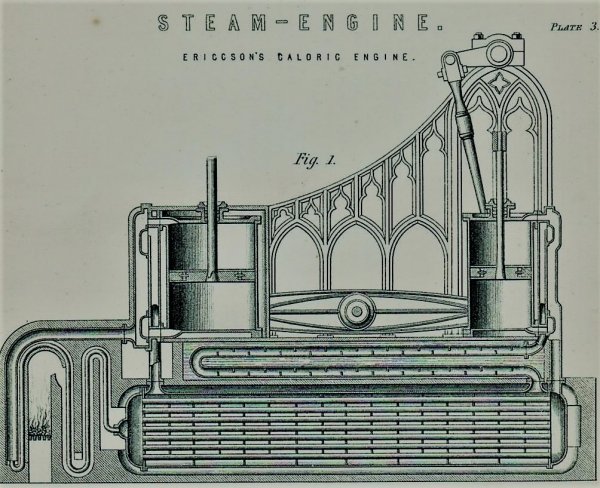The Ericsson Caloric Engine of 1833
Three detailled descriptions of the 1833 caloric engine are given:
- Presentation from The Mechanic's Magazine of 1834
- Presentation by John Ericsson in the same Mechanic's Magazine of 1834
- Presentation by William Conant Church in his biography of John Ericsson
A general overview is given here after.
Source: Lecture on the late improvements in Steam Navigation and the Art of Naval Welfare, with a brief notice of Ericsson's Caloric Engine, p. 52.
Date: New-York, May 10th, 1844
Author: John O. Sargent
ERICSSON's Caloric Engine (1833), which excited so much interest a few years ago in England; and which, if it should be brought into practical operation, will prove the most important mechanical invention ever conceived by the human mind, and one that will confer greater benefits on civilized life than any that has ever preceded it. For the object of it is the production of mechanical power by the agency of heat, at an expenditure of fuel so exceedingly small, that man will have an almost unlimited mechanical force at his command, in regions where fuel may now be said hardly to exist.
The announcement of such an idea may startle all those acquainted with the nature of heat, and the well known limits of the amount of mechanical power which any given quantity of caloric is capable of producing ; more particularly, as it is a well established fact, that a given quantity of heat will exert an equal amount of mechanical power, to whatsoever medium it may be imparted.
Ericsson's theory of heat is altogether in opposition to the received notion, that the mechanical force produced will bear a direct known proportion to the quantity of caloric generated ; and that the power exerted in our best constructed steam-engines is nearly the measure of that effect.
The late professor HARVEFELDT, of Sweden, one of the first mathematicians of the day, stated in a public lecture, not many years ago, that there is nothing in the theory of heat which proves that a common spirit lamp may not be sufficient to drive an engine of an hundred horse power.
It will readily be believed that the professor had but few hearers who did not smile at the suggestion ; but among those few we may number ERICSSON, who, from the earliest period of his mechanical labors, had been in the habit of regarding heat as an agent, WHICH, WHILST IT EXERTS MECHANICAL FORCE, UNDERGOES NO CHANGE.
This extraordinary fact, ERICSSON exemplifies, by a simple but conclusive illustration ; for the readier reception of which, by the audience, it will be well to introduce particular dimensions.
Suppose the piston of an ordinary steam-engine cylinder to be at the bottom, and suppose the force of the steam intended to be admitted into this cylinder under the piston to act with the force of 100,000 pounds, which is the force on a piston of 50 inches diameter, acted upon by steam of 50 pounds pressure to the square inch. Suppose the cylinder to be ten feet long, and the piston to be loaded with a weight equal to these 100,000 pounds.
If, now, a sufficient quantity of steam of the stated pressure be admitted from below the piston, this load will be elevated through the whole length of the cylinder ; and hence we shall have raised a weight of 100,000 pounds through a space of ten feet.
But who will contend that this immense amount of mechanical force has required any EXPENDITURE OF HEAT? Does not the steam, after having lifted this weight, contain just as much heat as it did before leaving the steam-boiler less only the losses by radiation ? And does not that heat retain all the properties AFTER the operation which it possessed BEFORE ? Am I, then, incorrect in stating that we have obtained this power without changing the nature, or diminishing the energy of the heat employed ?
But although nature has furnished us with an agent of such extraordinary properties for the production of mechanical force, how imperfectly do we employ it !
In the low-pressure engine we turn the steam, after having performed its good office, into a condensing apparatus where the heat is in a manner annihilated ; and in the high-pressure engine, we throw it away into the atmosphere. Yet men, even of mechanical distinction, ridicule the idea of superseding the steam-engine ; and Science seems to pause contentedly in the contemplation of its admitted perfection. For a mere theorist to attempt an exposition of its defects, or to suggest a substitute would, under such circumstances, excite little attention ; but the opinions and views, in this connection, of a man of great practical knowledge, who has planned and constructed hundreds of steam-engines, are entitled, certainly, to peculiar consideration.
